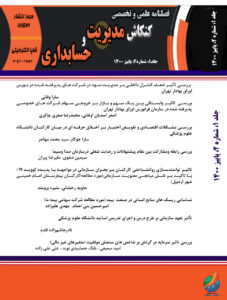مقاله: پژوهشی
صفحه: ۱۱۹- ۱۳۶
نویسندگان:
کتایون خطیبی[۱]، فائزه محمدی[۲]
[۱] دانشجوي كارشناسي ارشد مديريت فناوری اطلاعات گرایش سیستم های اطلاعاتی پیشرفته، واحدصفادشت دانشگاه آزاد اسلامی ، تهران ، ايران
[۲] مدرس گروه مدیریت فناوری اطلاعات، دانشگاه آزاد اسلامی ، واحد صفادشت، تهران ، ایران
چکیده
هدف از نگارش تحقیق حاضر، تعیین تاثیر کیفیت خدمات الکترونیک بر وفاداری الکترونیک با توجه به نقش میانجی ارزش لذتبخش میباشد. این تحقیق، از نظر هدف، کاربردی و از لحاظ گردآوری دادهها، توصیفی- پیمایشی محسوب میشود. ابزار گردآوری دادهها نیز پرسشنامه بود که برای تدوین آن از مطالعات کتابخانهای و میدانی استفاده شد. در این تحقیق، کیفیت خدمات الکترونیک به عنوان متغیر مستقل، وفاداری الکترونیک به عنوان متغیر وابسته و ارزش لذتبخش نیز به عنوان متغیر میانجی در نظر گرفته شدند. جامعه آماری تحقیق، مشتریان بانک صادرات بودند که از خدمات بانک، بهصورت اینترنتی استفاده میکنند که با مراجعه به جدول مورگان، ۲۸۴ نفر به عنوان نمونه آماری و تصادفی انتخاب شدند.نتایج حاصل از بکارگیری مدلسازی معادلات ساختاری در محیط نرمافزار لیزرل بیانگر آن بود که کیفیت خدمات الکترونیک معادل ۰.۵۷ بر ارزش لذتبخش و ارزش لذتبخش نیز معادل ۰.۷۶ بر وفاداری الکترونیک مشتریان تاثیرگذار است.
کلمات کلیدی: کیفیت خدمات الکترونیک، ارزش لذت بخش، وفاداری الکترونیک
Investigating the Relationship between Auditor Independence and Relevance of Accounting Information Value of Companies Listed in Tehran Stock Exchange
[2] Lecturer of Information Technology Management Department, Islamic Azad University, Safadasht Branch, Tehran, Iran
The purpose of writing the current research is to investigate the influence of e-service quality on customers’ e-loyalty with mediating role of hedonic value in Sadeat bank. The research is applicable from goal and descriptive from data collection. Data gathering tool is questionnaire for which library and fieldwork were utilized for its designation. Statistical society includes all online customers of Saderat bank which were unlimited. Referring Morgan table, 384 ones were selected as statistical and random sample. In the research e-service quality was independent variable, customers’ e-loyalty was dependent and hedonic value was moderating one. The results of applying structural equation model in LISREL software environment showed that e-service quality affects hedonic value (0.57) and hedonic value affects e-loyalty (0.76). Indeed, it can be claimed that hedonic value mediated the influence of e-service quality on customers’
Keywords: e-service quality, enjoyable value, e-loyalty
